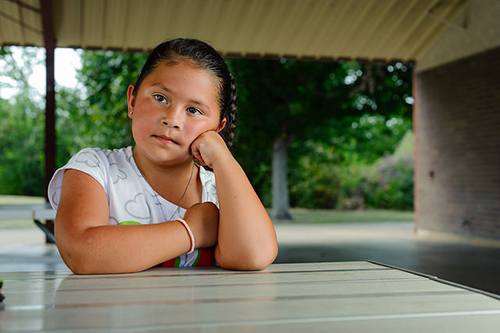Intervention can help mothers and children exposed to domestic violence
It’s that time again, the start of another new school year. While it’s an exciting time for many students who are reconnecting with friends and meeting new teachers, for some children, school offers a safe haven from a home environment that causes great pain.

It is well documented that children who are exposed to interpersonal violence – or acts of violence between individuals that know each other, oftentimes those in committed relationships – experience long-term detrimental effects that impact their emotional and social development, affecting both current and future relationships. Research has also shown that, over time, children who are exposed to violence have a potential to develop or emulate these behaviors.
Nora Montalvo-Liendo, PhD, RN, FAAN, clinical assistant professor at the Texas A&M Health Science Center College of Nursing’s McAllen campus, has dedicated her professional career to combating domestic violence through research that brings to light the impact of interpersonal violence on families exposed to such behavior, with a special emphasis on Mexican American populations.
“Children don’t have to be on the receiving end of violence to show these symptoms,” she says. “In fact, children who witness violence at home are also at higher risk for externalizing emotions and experience challenges with their social development, which can lead to a continuation of the cycle of violence.”
The cycle persists because many children exposed to violence don’t know how to express strong emotions, like anger or disappointment, in a healthy manner. Sadly, these violent eruptions are often directed at those they love the most.
In addition to externalizing their feelings, children exposed to violence can experience other problems that affect their overall health. Increased physical health issues, traumatic stress symptoms, and subsequent challenges with regulating emotions and responses to others have all been associated with exposure to interpersonal violence. Unfortunately, while there are many established services to help women cope with domestic violence and sexual assault, there are limited services for children.
“Our research will expand the services available to children and equip professionals with the most accurate information possible,” Montalvo-Liendo said. “We want to help both mothers and children in these situations get meaningful help to not only get out of violent situations, but to also prevent violence from continuing through the next generation. Our research seeks to stop the cycle of abuse.”
A collaborative project with the University of Michigan, Montalvo-Liendo’s research is an extension of the evaluation of the well-regarded Kid’s Club and Mom’s Empowerment programs, community-based programs for women and children exposed to interpersonal violence. Mom’s Empowerment is a 10-week session for mothers with one school-age child who was exposed to interpersonal violence. Group facilitators work with mothers for one hour each week, focusing on parenting skills and empowerment. The children attend a separate group, Kid’s Club, during the same time frame and work with group leaders on social skills and how to deal with conflict.
While helpful to the communities in which the programs are made available, these sessions have not traditionally been offered in Spanish, limiting access to a number of families in need of such services. According to Montalvo-Liendo, including Spanish-speaking populations in the study will garner valuable information for addressing violence in Latina communities that has not previously been available. She hopes to use this information to equip more medical professionals and help more families, particularly in the South Texas region.
“We want to work with both moms and children to give them the education they need to deal with conflict, all while collecting evidence to help even more people in these situations,” she said. “They may have emotions of anger and rage, but they can learn to express them without violence and without disrespect.”
Empowering mothers is extremely important. Not only are they responsible for getting out of a violent situation, but they must help their children cope with the aftermath of the abuse, mothers have to be emotionally prepared themselves, in order to help their children navigate their feelings.
“We don’t openly ask children about their experiences with abuse, they will tell us during our conversations,” said Montalvo. “We can ask a child what they want to be when they grow up and they might answer ‘a policeman’ and when we ask why, they may say ‘so I can protect my mom.’”
“We want to find ways to stop or deter this violence, and we have to do this early-on,” she said. “This is a complex phenomenon, and there are so many effects of violence that we don’t understand. In addition to helping families directly, we hope to use our findings to educate nurses, teachers, counselors and entire communities.”
Media contact: media@tamu.edu


